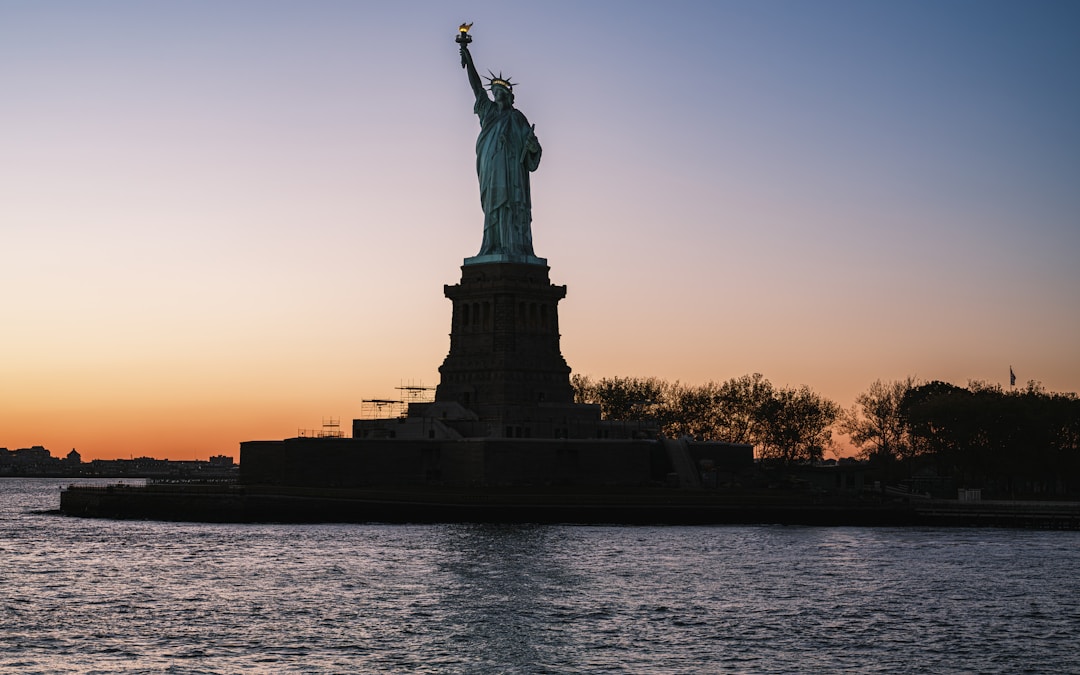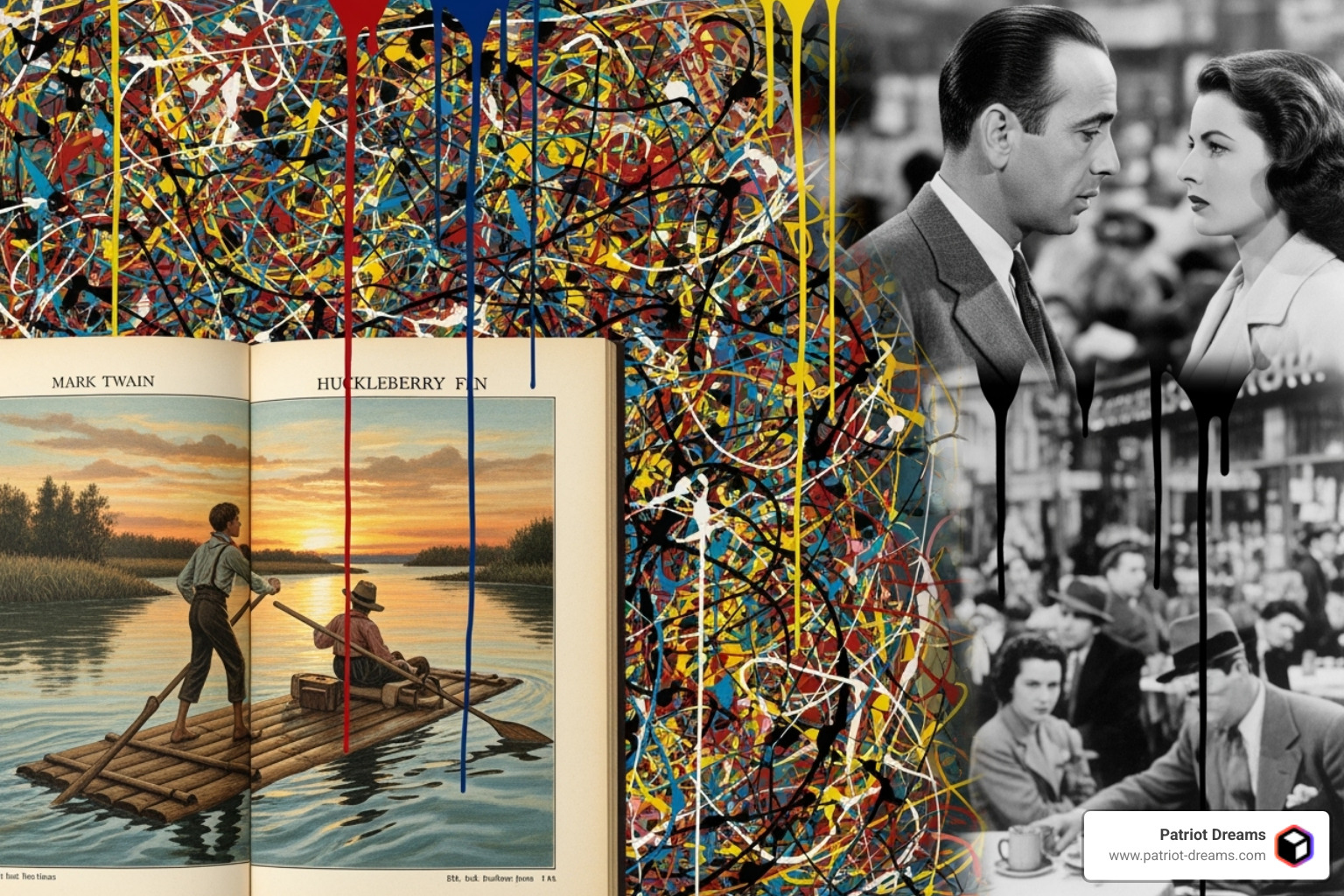The American Story: Values, Beliefs, and Myths Unveiled


Why Understanding American Cultural History Matters
American cultural history is the story of how the nation's values, beliefs, and myths have evolved. It's not just about dates and events; it's about understanding the ideas and expressions that define the American experience.
Key Aspects of American Culture:
- Core Values: Individualism, freedom, and the pursuit of the American Dream.
- Key Periods: From the colonial era and the Revolution to westward expansion and the digital age.
- Cultural Forces: Literature, music, and film have all shaped the national identity.
- Diverse Influences: Contributions from Native Americans, immigrants, and various ethnic groups have created a rich cultural mix.
- Ongoing Themes: The tension between liberty and security, unity and diversity, and tradition and progress continues to define the nation.
From the Puritan work ethic to Hollywood, American culture is a dynamic mix of influences. Understanding this history helps explain everything from our political debates to our everyday lives. It's the key to understanding what makes America tick.
The Foundations of American Culture: Core Values and Enduring Myths
At the heart of American cultural history is a set of core values and enduring myths that have shaped the nation's identity. These ideas are not static; they have been constantly reinterpreted and challenged over time.
Individualism is a cornerstone, rooted in Enlightenment ideals and the experience of the American frontier. This value emphasizes self-reliance and personal freedom, and it continues to be a powerful force in American society.
Closely linked to individualism are the ideals of freedom and equality. While the application of these concepts has been a source of ongoing struggle, they remain central to the American way of life. The nation's history is marked by the continuous effort to extend these rights to all people.
The American Dream, the belief in upward mobility through hard work, is another powerful cultural narrative. This dream is often intertwined with consumerism, which became a major force in the 20th century as mass production made more goods accessible to more people.
These values and myths are expressed through our culture—from literature and music to architecture and the internet. They reveal how past generations saw themselves and their place in the world.
A Journey Through American Cultural History
American cultural history is a dynamic story of change, marked by key periods of change and conflict.

From Colonies to a New Republic (1600s-1800)
The colonial era was shaped by diverse European settlers and their interactions with Native American cultures. The Puritans in New England, for example, established a society based on religious principles and a strong work ethic. As the colonies grew, Enlightenment ideas about liberty and self-governance took hold, fueling the American Revolution and the creation of a new republic. Foundational documents like The Federalist Papers reflect the intellectual debates of this era.
Expansion, Conflict, and Industrialization (19th Century)
The 19th century was defined by westward expansion, driven by the idea of "Manifest Destiny." This movement, while central to the American story, also led to the displacement of Native American populations. The Civil War and Reconstruction period fundamentally reshaped the nation, ending slavery but leaving a legacy of racial tension. The Gilded Age followed, bringing rapid industrialization, mass immigration, and the rise of cities, which created both immense wealth and significant social challenges.
The American Century and Beyond (20th-21st Century)
The 20th century saw the United States emerge as a global power. The Progressive Era introduced social reforms, while the Roaring Twenties celebrated consumerism and new forms of entertainment. After the Great Depression and World War II, America experienced a period of prosperity that led to the growth of suburbs and a car-centric culture. The Civil Rights Movement of the 1950s and 1960s, along with the counterculture movement, challenged the status quo and reshaped American society. Today, the digital revolution continues to transform how we live, work, and connect with one another.
The Canvas of a Nation: Arts, Media, and Identity
The arts and media are powerful forces in American culture, reflecting and shaping the nation's identity. From novels and music to film and television, these creative expressions tell the story of America.

How Stories Shape the American Way of Life
American literature has always been a space for exploring the nation's ideals and struggles. Early on, it provided a platform for women to emerge as influential authors. Later, movements like Transcendentalism championed individualism, while the writers of the Lost Generation and the Harlem Renaissance captured the complexities of the 20th century. Authors like Mark Twain, F. Scott Fitzgerald, and Toni Morrison have become iconic voices, each offering a unique perspective on the American experience.
The Soundtrack of a Nation: A Musical Evolution
American music is a rich mix woven from diverse cultural threads. It began with the spirituals of enslaved Africans, which evolved into the blues and, eventually, jazz—America's first great musical export. Country music emerged from the folk traditions of the South, while rock and roll captured the rebellious spirit of the mid-20th century. More recently, hip-hop has grown from a grassroots movement into a global phenomenon. These genres, and the artists who created them, have provided the soundtrack for American life.
Hollywood and the Screen: Crafting a National Image
Hollywood has played a central role in shaping America's image, both at home and abroad. The studio system of the Golden Age created iconic films and stars that defined an era. The arrival of television brought these stories into American homes, helping to create a shared national culture. In the 1970s, a new wave of filmmakers challenged traditional narratives, while the blockbuster era made American cinema a global force. Today, streaming services and digital media continue to transform how we consume and create stories, further blurring the lines between national and global culture.
A Nation of Nations: Diversity's Impact on Culture
America's identity as a "nation of nations" is central to its cultural history. The constant interplay of different cultures has created a dynamic and changing society. While the idea of a "melting pot" was once popular, many now see America as a "salad bowl," where individual cultures retain their unique flavors while contributing to a greater whole.

The Contributions of Diverse Groups to American Cultural History
Every group that has come to America has enriched its culture:
- African Americans have profoundly influenced American music, from spirituals and jazz to hip-hop, and have been at the forefront of the fight for civil rights and equality.
- Hispanic and Latino communities have brought vibrant traditions in food, music, and language, shaping the cultural landscape of the Southwest and major cities across the country.
- Asian American contributions range from culinary innovations and influential literature to significant advancements in technology and business.
- European immigrants from countries like Ireland, Italy, and Germany laid the groundwork for much of what is considered traditional American culture, building cities and industries.
Regional Cultures and the Urban-Rural Divide
Geography also plays a crucial role in shaping American culture. The country is a mosaic of distinct regional identities:
- The South is known for its hospitality, strong traditions, and unique musical heritage.
- New England carries a legacy of Puritanism, with a focus on education and civic engagement.
- The Midwest is often seen as the nation's heartland, valued for its practicality and strong work ethic.
- The West Coast is a hub of innovation and forward-thinking, from Hollywood to Silicon Valley.
These regional differences, along with the growing urban-rural divide, contribute to the rich complexity of American culture. While they can sometimes be a source of tension, they also ensure that America is a place of incredible variety and constant change.
Frequently Asked Questions about American Cultural History
Here are answers to some common questions about the forces that have shaped American culture.
What are the core values that define American culture?
Key American values include individualism, emphasizing self-reliance; freedom, a foundational principle that has been central to many historical struggles; and the American Dream, the belief in the possibility of upward mobility through hard work. Consumerism has also become a significant cultural force, linking personal identity to the acquisition of goods.
How has immigration shaped American culture?
Immigration is a defining feature of American history. Each wave of immigrants has introduced new foods, languages, music, and traditions, creating a dynamic cultural blend. This process, often described as a "melting pot" or "salad bowl," has made American culture uniquely diverse and changing. From Italian pizza to Latin music, the contributions of immigrant communities are woven into the fabric of daily life.
What is the global impact of American culture?
American culture has a vast global reach, often referred to as "Americanization." Hollywood films, American music genres like jazz and hip-hop, and major tech companies have all had a profound influence worldwide. This cultural exchange is not one-way; American culture is also increasingly shaped by global trends, creating a dynamic and interconnected cultural landscape.
Frequently Asked Questions about American Cultural History
After diving deep into the rich mix of American cultural history, you might still have some burning questions. Let's tackle the most common ones that people ask about what makes American culture tick.
What are the core values that define American culture?
When you think about what makes America distinctly American, several key values rise to the surface. Individualism sits at the very heart of it all—that belief in self-reliance and personal achievement that traces back to the frontier days. You can still see this "rugged individualism" playing out today, especially in rural communities where people take pride in solving their own problems.
Freedom and equality form another cornerstone, though their interpretation has sparked countless debates throughout history. These aren't just words on parchment—they're living ideals that different generations have fought to expand and redefine. Think about how the Civil Rights Movement challenged the nation to live up to its promise of equality for all.
The American Dream remains a powerful force, that enduring belief that hard work can lift you up the social ladder. It's the story your grandparents might have lived when they came to America with nothing but hope in their pockets.
And let's be honest—consumerism has become deeply woven into the American identity too. From the rise of shopping malls to today's online marketplace, the idea that we can buy our way to happiness has shaped how many Americans see success and fulfillment.
These values aren't set in stone, though. Each generation reinterprets them, challenges them, and makes them their own. That's what keeps American cultural history so dynamic and ever-changing.
How has immigration shaped American culture?
Immigration isn't just part of America's story—it is America's story. From the moment different groups started arriving on these shores, they began mixing their traditions, foods, languages, and dreams into something entirely new.
Think about your favorite "American" foods for a moment. Pizza from Italian immigrants, tacos from Mexican culture, bagels from Eastern European Jews—they all became as American as apple pie (which, by the way, has European roots too!). Each wave of newcomers brought their own spices to the cultural stew.
The music you hear today tells the same story. Jazz emerged from the African American experience, country music from rural Southern traditions, and hip-hop from urban communities. These sounds didn't just stay in their original neighborhoods—they spread across the country and around the world, becoming the soundtrack of America.
Some people like to call this mixing a "melting pot," where everything blends together. Others prefer the "salad bowl" idea, where different groups keep their distinct flavors while contributing to the whole dish. Both metaphors capture something true about how immigration has continuously reshaped what it means to be American.
The beauty of this process is that it never stops. Each new group of Americans adds their chapter to the ongoing story, making the culture richer and more complex.
What is the global impact of American culture?
Walk through almost any city in the world, and you'll see American culture's fingerprints everywhere. Hollywood movies play in theaters from Tokyo to Lagos. American music pumps through headphones in subway stations across Europe. Social media platforms created in Silicon Valley connect billions of people worldwide.
This cultural reach happened through America's entertainment industries, which became incredibly powerful in the 20th century. Hollywood didn't just make movies—it exported American values, fashion, and ways of life to global audiences. When people around the world watch American films or TV shows, they're getting a glimpse into how Americans see themselves and their world.
Music has been another powerful ambassador. Jazz was perhaps America's first major cultural export, followed by rock and roll, and later hip-hop. These genres didn't just entertain—they carried messages about freedom, rebellion, and individual expression that resonated with young people everywhere.
The internet revolution amplified this reach even more. American tech companies created platforms that shape how people worldwide communicate, share information, and express themselves. That's a kind of cultural influence that previous generations could never have imagined.
But here's what's fascinating—it's not all one-way traffic anymore. American culture is increasingly shaped by global influences flowing back in. International cuisines, fashion trends, and entertainment styles constantly remix with homegrown American traditions. This back-and-forth cultural conversation makes American cultural history more interconnected with the world than ever before.
The result is a culture that's both distinctly American and surprisingly universal—one that continues to evolve as it encounters new influences and ideas from around the globe.
Conclusion
As we've journeyed through American cultural history, one thing becomes wonderfully clear: culture isn't a dusty old book on a shelf. It's a living, breathing story, always growing and changing. Think of it as a constant, lively conversation, full of different voices and viewpoints. These are the "contested narratives" we encounter, where Americans debate what their nation truly means and what it should be. It’s all about the fascinating dance between big ideals and everyday realities.
We've explored how fundamental ideas like individualism and the enduring American Dream have shaped everything, from pioneering spirits to modern aspirations. And we've seen how powerful forces like literature, music, and cutting-edge technology have played a huge role in weaving this cultural mix. Americans have always been natural storytellers, using these tales to understand their challenges and imagine endless possibilities for their way of life.
What truly makes America special is its incredible blend of people. Every group, no matter their background—has generously added their unique flavor to our national culture. This rich mix has given America a global reach, influencing the world in countless ways. Yet, even with all that diversity, the debates over freedom, equality, consumerism, and individualism continue to shape who we are. These ongoing conversations are what keep our culture vibrant and alive.
The way we understand our own history is always evolving too. We're constantly learning to include more voices and experiences, creating a richer, more complete picture of who Americans are.
Here at Patriot Dreams, we truly believe that understanding this complex, shared identity is incredibly important. It’s why we pour our hearts into bringing American history, its rich heritage, and personal stories to life through immersive audio journeys. We invite you to dive deeper into these fascinating narratives and find how the past continues to shape our vibrant present.
Explore America's story through audio journeys at Patriot Dreams
Join the Patriot Dreams Community
Download the app today and start your journey through American history and personal legacy.

Explore Our Latest Insights
Dive into stories that shape our American legacy.



